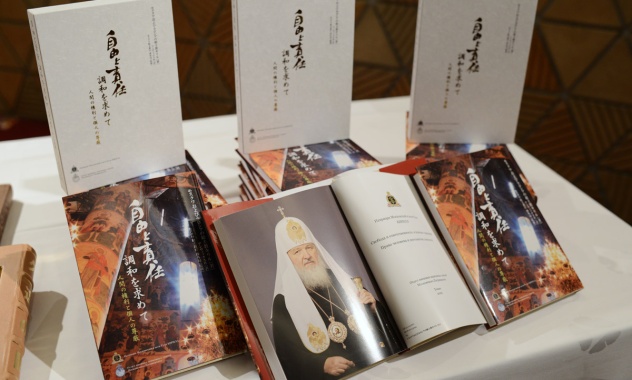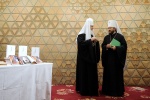The book ‘Freedom and Responsibility’ by Patriarch Kirill presented in Tokyo
On September 16, 2012, the Japanese version of the book ‘Freedom and Responsibility: In a Search for Harmony. Human Rights and Dignity’ by His Holiness Patriarch Kirill of Moscow and All Russia was presented to the public.
The book was presented by Metropolitan Hilarion of Volokolamsk, head of the Moscow Patriarchate’s department for external church relations. He noted it was His Holiness’s first book to come out in Japanese and said the work ‘opens for the Japanese reader an opportunity to familiarize himself with the basics of Orthodox theology and the contemporary Russian religious and social thought’.
In his remarks the DECR chairman underscored that the book by Patriarch Kirill ‘is a philosophical answer to the attempt to build a world which is deprived of the spiritual dimension and which sees in national traditions an obstacle to economic growth’.
The work by Patriarch Kirill consists of articles and statements he prepared during the Moscow Patriarchate’s work on its conceptual document on human rights entitled ‘The Russian Orthodox Church’s Basic Teaching on Human Dignity, Freedom and Rights’. It was adopted by the 2008 Bishops Council and provoked a broad public response. It was presented later to a number of international organizations and its ideas were discussed in the course of inter-Christian and interreligious dialogue.
There was also a presentation of the book ‘And an Eternal Fight…’ by A. Khlopetsy. It is about the life and spiritual development of V. Shchelkov, the founder of the Russian system of sambo single combat, self-defense without arms. The first book of the trilogy, ‘Development’, was written together with the chairman of the Moscow Patriarchate’s department for external church relations, Metropolitan Kirill of Smolensk and Kaliningrad (now Patriarch of Moscow and All Russia). The book is about the years Vassily Shchelkov spent in Japan, his studies at a theological seminary and the impact made on his development and life by St. Nicholas of Japan.
Addressing the gathering, Patriarch Kirill said:
‘First of all I would like to thank all who have translated these two books into Japanese. It seemed that these books have to do with quite different spheres of human life. On one hand, there are theoretical reflections on human freedom, dignity and responsibility, and on the other, hand-to-hand fighting. For me however, the book about Vassily Shchelkov is an illustration to theoretical reflections about human freedom, responsibility and dignity. One may reason as much as he can about freedom; people can have the same and different views, but a vivid example is important as it helps people understand what human freedom really means.
‘It seems to me that it is precisely the image of a fighter who is a perfect technical master of a very dangerous fight that can be a vivid illustration to this issue. He is head and shoulders above others as he can do what others cannot. And the way he uses his gift, skills and knowledge really determines very much, sometimes health and even life of people. If we give so absolute an importance to freedom, we give this man the right to freely use the skills which others use irresponsibly.
‘On the other hand, what happens to a man who freely uses this gift for a good cause? He harms nobody, he makes nobody unhappy, he is capable of sharing his experience and his inner state with others, helping them to become wiser.
‘Properly speaking, the whole meaning of the book about freedom and responsibility is to state that one notion cannot be used without the other. One cannot juggle with such words as human freedom and rights. These remarkable words help excellent features to manifest themselves in a person only if they are used responsibly, if one uses his rights and his freedom in a morally responsible way.
‘What I am saying now is not an evident truth for many people. The discussion on this issue is not closed; it continues in Russia and in Japan and throughout the world. Sometimes this discussion goes on very dramatically; sometimes attempts are made to politicize or even ideologize it. I have tried to present the Orthodox view of this problem. What has out is for you to judge’.
DECR Communication Service
Other events
-
18.09.2012 20:36Patriarch Kirill: I will pray to St. Nicholas Equal-to-the-Apostles asking him to help open a new page in relations between Russia and Japan
-
18.09.2012 11:45His Holiness Patriarch Kirill meets with the Emperor of Japan, Akihito
-
18.09.2012 11:40His Holiness Patriarch Kirill meets with Japanese Prime-Minister Yoshihiko Noda
-
18.09.2012 10:23(Russian) Святейший Патриарх Кирилл наградил ряд мирян, потрудившихся над изданием на японском языке книг «Свобода и ответственность» и «И вечный бой…»
-
18.09.2012 07:55Primate of Russian Orthodox Church meets with Russia’s ambassador to Japan
-
18.09.2012 06:47(Russian) Председатель ОВЦС посетил российское Посольство в Токио и вручил церковные награды ряду дипломатов
-
17.09.2012 08:33(Russian) Святейший Патриарх Кирилл: Святой равноапостольный Николай явил на японской земле силу и красоту Евангелия
-
17.09.2012 07:48The book ‘Freedom and Responsibility’ by Patriarch Kirill presented in Tokyo
-
17.09.2012 07:47(Russian) Слово митрополита Волоколамского Илариона на презентации японского перевода книги Святейшего Патриарха Московского и всея Руси Кирилла «Свобода и ответственность: в поисках гармонии. Права человека и достоинство личности»
-
17.09.2012 07:28(Russian) Святейший Патриарх Московский и всея Руси Кирилл посетил Подворье Русской Православной Церкви в Токио
-
16.09.2012 20:48(Russian) Святейший Патриарх Кирилл совершил на токийском кладбище Янака молебен у мощей святого равноапостольного Николая Японского и литию по православным архиереям, служившим в Японии
-
16.09.2012 20:09Patriarch Kirill celebrates Divine Liturgy at Resurrection Cathedral in Tokyo
-
15.09.2012 20:38(Russian) Предстоятель Русской Церкви возложил цветы к памятнику жертвам цунами
-
15.09.2012 19:55(Russian) Святейший Патриарх Кирилл посетил кафедральный собор Сендайской епархии
-
14.09.2012 19:23(Russian) Предстоятель Русской Церкви молитвенно почтил память соотечественников, погребенных в Японии
-
14.09.2012 18:40(Russian) Святейший Патриарх Кирилл посетил Воскресенский храм в Хакодате
-
14.09.2012 17:16(Russian) Начался Первосвятительский визит Святейшего Патриарха Кирилла в Японию
-
10.09.2012 21:15His Holiness Patriarch Kirill to visit Japan
























